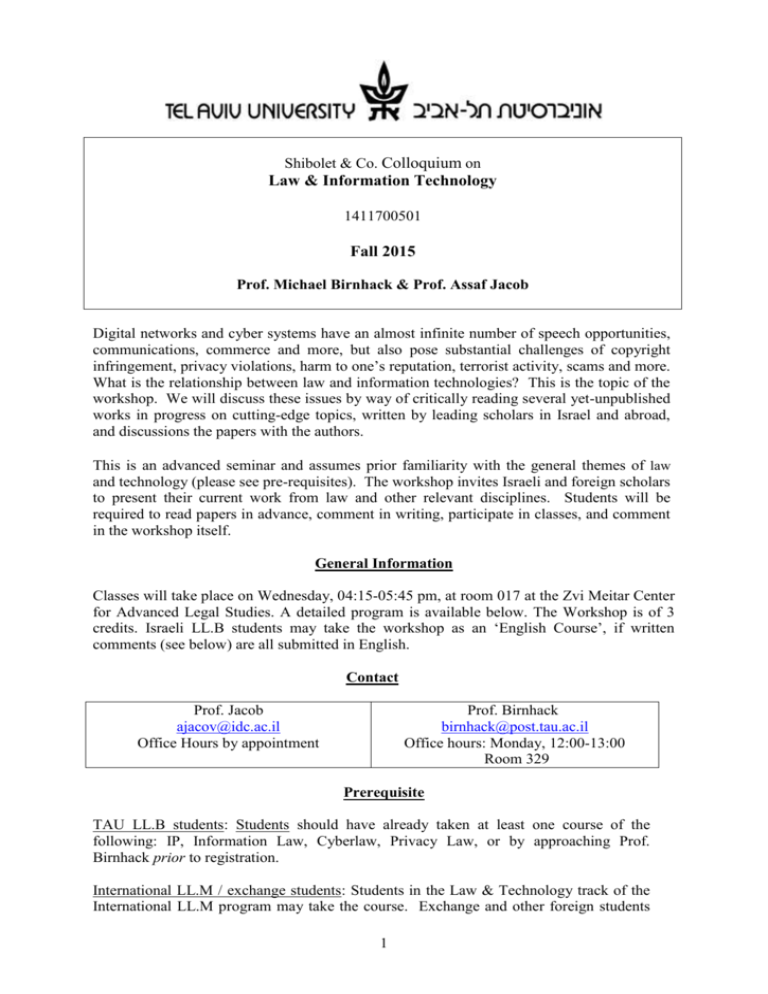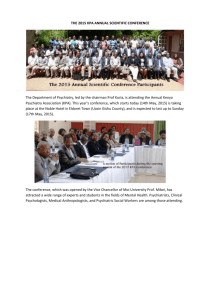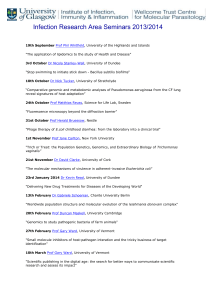רשימת קריאה
advertisement

Shibolet & Co. Colloquium on Law & Information Technology 1011044141 Fall 2015 Prof. Michael Birnhack & Prof. Assaf Jacob Digital networks and cyber systems have an almost infinite number of speech opportunities, communications, commerce and more, but also pose substantial challenges of copyright infringement, privacy violations, harm to one’s reputation, terrorist activity, scams and more. What is the relationship between law and information technologies? This is the topic of the workshop. We will discuss these issues by way of critically reading several yet-unpublished works in progress on cutting-edge topics, written by leading scholars in Israel and abroad, and discussions the papers with the authors. This is an advanced seminar and assumes prior familiarity with the general themes of law and technology (please see pre-requisites). The workshop invites Israeli and foreign scholars to present their current work from law and other relevant disciplines. Students will be required to read papers in advance, comment in writing, participate in classes, and comment in the workshop itself. General Information Classes will take place on Wednesday, 04:15-05:45 pm, at room 017 at the Zvi Meitar Center for Advanced Legal Studies. A detailed program is available below. The Workshop is of 3 credits. Israeli LL.B students may take the workshop as an ‘English Course’, if written comments (see below) are all submitted in English. Contact Prof. Jacob ajacov@idc.ac.il Office Hours by appointment Prof. Birnhack birnhack@post.tau.ac.il Office hours: Monday, 1:240-13:00 Room 9:3 Prerequisite TAU LL.B students: Students should have already taken at least one course of the following: IP, Information Law, Cyberlaw, Privacy Law, or by approaching Prof. Birnhack prior to registration. International LL.M / exchange students: Students in the Law & Technology track of the International LL.M program may take the course. Exchange and other foreign students 1 should meet the prerequisite of having studied at least one course on internet law / cyberlaw / intellectual property / digital privacy. In case of doubt, please contact Prof. Birnhack prior to registration. Format In most classes we will host an Israeli or foreign scholar who will present his or her work in progress, on a topic related to law & IT. At least a week before the meeting, and when possible even earlier, students will have access to the draft of the paper that will be discussed, via Moodle. Students are required to read the paper, asses its arguments and methodology, and prepare a written comment for a total of 7 papers. During the first 15 minutes of each class, the guest will recap the major arguments and contextualize the paper within his or her broader work. Thereafter we will have one or two designated commentators, according to a list that will be determined in advance, each with no more than 5 minutes to comment. We will then open the floor for free discussion with the guest. Additional guests may join us, from the Faculty or elsewhere. Assignments The grade is composed of three components: one oral comment 10%; active participation – 20%; seven written comments – 70%. i. Oral Comment: The designated comment should be thoughtful and critical (and polite…), on the main argument of the paper. The comment should be based on a close reading of the paper, and to the extent relevant, on researching related material, for example, if the paper discusses a major case, or a technological enterprise, it is a good idea to read the case and figure out the technology at stake. Insights from other disciplines are more than welcome. Examples that may strengthen the arguments – or perhaps refute it – are welcome. Avoid technical, style, grammar, or citation comments. ii. General Discussion: Reading all papers and participating in all classes is required. The grade in this component will be based on the quality of questions and comments during classes. We expect these to reflect the thorough and critical reading of the papers. It is a good idea to prepare some notes in advance. iii. Written Comments. Each student should submit 7 written comments during the semester. The choice is yours, according to your personal interests. Comments should be original and written independently, and meet academic ethical standards. Each comment shall not exceed 400 words. You should email the comments to both instructors no later than Sunday, 12:00 pm, before the class in which the paper will be discussed. The comments should focus on one major argument in the paper, present it very briefly and spend the vast majority of the space to criticize the argument, suggest counter-arguments, or take the argument one step further and support it. We might ask for additional reading for some of the meetings. Some of our guests are not lawyers. There is no need to teach them law! The idea is to try to understand their perspective, and supplement or criticize it while appreciating the natural discourse gaps between different disciplines. Before each class, it might be a good idea to visit the guest’s homepage. 2 Classes [There might be changes during the term] 21.10.15 Introduction: Law & Information Technology # optional reading: LAWRENCE LESSIG, CODE CYBERSPACE (1999) AND OTHER LAWS OF 28.10.15 Exercise: Jack M. Balkin The Path of Robotics Law, 6 CAL L. REV. CIR. 45 (2015) 04.11.15 Dr. Orna Rabinovich Einy Haifa Law Digital Justice: Dispute Resolution and Prevention in the Internet Age 11.11.15 Dr. Elad Segev, TAU Media Studies Temporal Patterns of Scientific Information-Seeking on Google and Wikipedia 18.11.15 Prof. Peter Menell, Berkeley Law Adapting Copyright for the Mashup Generation 25.11.15 Prof. Ronald Leenes, Tilburg Institute for Law, Technology, and Society Facepalm. Why Does Technology Regulation (Seem to) Fail (More Often)? 02.12.15 Prof. Séverine Dussolier, Sciences Po, Ecole de Droit Degrees of Exclusivity and Inclusivity in Intellectual Property ** 06.12.15 evening: S. Horowitz Institute for IP in memory of Amnon Goldenberg – Launch event ** 7-8.12.15 Workshop: OUP Handbook on IP Law 09.12.15 Prof. Rochelle Dreyfuss, NYU Law (with Orly Lobel) Economic Espionage as Reality or Rhetoric: Prosperity as a Component of National Security 16.12.15 Prof. Karen Eltis, Ottawa Law A Purposive Interpretation of the Open Court Principle in the Digital Age: Privacy, Access to Justice and Online Posting of Court Documents 23.12.15 Dr. Erez Shmueli, TAU Engineering Are You Your Friends’ Friend? Poor Perceptions of Friendship Ties Limits the Ability to Persuade Others 30.12.15 Prof. Dotan Oliar, U. Virginia School of Law Copyright Registration 06.01.16 Prof. Ronen Avraham, TAU Law End-User’s Liability 13.01.16 Dr. Tami Kricheli-Katz (TAU Law), Dr. Tali Regev (IDC Economy) Women and Men in Online Product Markets - Evidence from eBay End of term: 17.1.16 3






